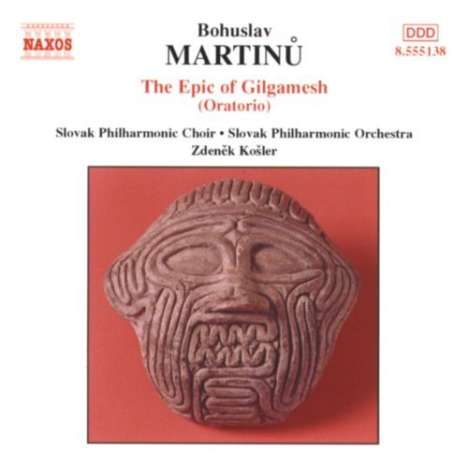Bohuslav Martinu: Gilgamesch (Oratorium) auf CD
Gilgamesch (Oratorium)
Herkömmliche CD, die mit allen CD-Playern und Computerlaufwerken, aber auch mit den meisten SACD- oder Multiplayern abspielbar ist.
(soweit verfügbar beim Lieferanten)
- Künstler:
- Kusnjer, Margita, Vele, Depoltova, Slowakische Philh.& Chor, Zdenek Kosler
- Label:
- Naxos
- Aufnahmejahr ca.:
- 1989
- Artikelnummer:
- 5824849
- UPC/EAN:
- 0747313513826
- Erscheinungstermin:
- 4.3.2002
Der Held Gilgamesch, obwohl Gegenstand legendärer Heldentaten, regierte tatsächlich um 2700 v. Chr. in Babylonien. In dem Gedicht wird er von Enkidu begleitet, einem wilden Mann, der von einer Kurtisane gezähmt wird und sein ständiger Freund und Begleiter bei seinen Abenteuern ist. Enkidu weist die Avancen der Liebesgöttin Ishtar zurück, und als sie den Stier töten, den sie zur Bestrafung schickt, rächen sich die Götter, indem sie ihn töten. Gilgamesch sucht in seiner Trauer nach einer Möglichkeit, seinen Freund wieder zum Leben zu erwecken, und lernt schließlich aus seinem Grab über die Welt der Toten.
Das Oratorium besteht aus drei Teilen, der erste basiert auf den Tafeln 1 und 2 der zwölf aus der Bibliothek des Königs Aschurbanipal von Assyrien (669-630 v. Chr.) erhaltenen Tafeln, der zweite auf den Tafeln 7, 8 und 10 und der dritte auf Tafel 12. Die bemerkenswerte Vertonung des antiken Gedichts durch Martinů fängt die Freude und Trauer der antiken Welt ein, in der der Tod plötzlich und unerbittlich war. Es ist mit beträchtlicher Zartheit und Subtilität vertont, um die Vergangenheit in einem eklektischen Gebrauch von Modi und erzählerischen Kontrasten des gesungenen und gesprochenen Wortes heraufzubeschwören, die das zugrundeliegende Drama erheblich verstärken.
Product Information
The hero, Gilgamesh, although the subject of legendary exploits, actually ruled in Babylonia about 2700 B. C. In the poem he is accompanied by Enkidu, a wild man tamed by a courtesan and his constant friend and companion in his adventures. Enkidu rejects the advances of Ishtar, the goddess of love, and when they kill the bull she sends to punish them, the gods take revenge by killing him. Gilgamesh, in grief, seeks a means of restoring his friend to life, and finally learns from his shade about the world of the dead.
The oratorio is in three parts, the first based on Tablets 1 and 2 of the twelve tablets preserved from the library of King Ashurbanipal of Assyria (669-630 B. C.), the second on Tablets 7, 8 and 10 and the third on Tablet 12. The remarkable setting of the ancient poem by Martinů captures the joy and grief of the ancient world, where death was sudden and inexorable. It is scored with considerable delicacy and subtlety to evoke the past in an eclectic use of modes and telling contrasts of the sung and spoken word that add considerably to the underlying drama.
Rezensionen
Gramophone: "Jeder sollte sich dieses außerordentliche Werk zulegen, ob er nun Martinu-begeistert ist oder nicht."Disk 1 von 1 (CD)
-
1 Gilgames, H. 351: Bass Solo and Chorus: Gilgames!
-
2 Gilgames!
-
3 Gilgames, H. 351: Bass Solo: Vyslysela stiznost bozska Aruru
-
4 Gilgames, H. 351: (Chorus): Cloveka neznal ni vlast
-
5 Gilgames, H. 351: Bass Solo: Sam uz nechod
-
6 Gilgames, H. 351: Chorus: Sam uz nejde lovec
-
7 Gilgames, H. 351: Tenor Solo and Chorus: Zeno, hle, on!
-
8 Gilgames, H. 351: Bass Solo and Chorus: K stadu kdyz pak pohledl
-
9 Gilgames, H. 351: Soprano Solo: Ja k tobe vzhlizim
-
10 Gilgames, H. 351: Speaker: I souhlasil v nitru svem
-
11 Gilgames, H. 351: Chorus: Nam vsem v udel
-
12 Gilgames, H. 351: Speaker: Gilgames a Enkidu
-
13 Gilgames, H. 351: Tenor Solo: Ja pak vesel v onu tmu
-
14 Gilgames, H. 351: Chorus: Enkidu trapil se den
-
15 Gilgames, H. 351: Baritone Solo: Narek slyste muj, vy starci!
-
16 Gilgames, H. 351: Chorus: Enkidu nic nevidi
-
17 Gilgames, H. 351: Chorus: Gilgames, kam chvata?
-
18 Gilgames, H. 351: Baritone Solo: Skon pritele meho zdeptal mne
-
19 Gilgames, H. 351: Chorus: Gilgames, kam chvata?
-
20 Gilgames, H. 351: Introduction
-
21 Gilgames, H. 351: Soprano Solo: Gilgames, odekdy sily pozbyl?
-
22 Gilgames, H. 351: Baritone Solo: Mne pritele skon podlomil
-
23 Gilgames, H. 351: Speaker: Gilgames, jenz nevnikl
-
24 Gilgames, H. 351: Soprano Solo and Chorus: To hlina jest
-
25 Gilgames, H. 351: Baritone Solo and Chorus: Enlile, muj otce!
-
26 Gilgames, H. 351: Spes, vladce luny
-
27 Gilgames, H. 351: Eo, spln zadost!
-
28 Gilgames, H. 351: Hlina zeme ho zahy odnala nam
-
29 Gilgames, H. 351: Speaker, Baritone and Bass Soli with Chorus: I vyslysel ho Ea-buh
Mehr von Bohuslav Martinu
-
Alfred SchnittkeKonzert für Klavier 4-händig & KammerorchesterCDAktueller Preis: EUR 7,99
-
Bohuslav MartinuDie Griechische Passion2 CDsVorheriger Preis EUR 22,99, reduziert um 0%Aktueller Preis: EUR 19,99
-
Bohuslav MartinuSämtliche Werke für Violine & Orchester Vol.1CDVorheriger Preis EUR 19,99, reduziert um 0%Aktueller Preis: EUR 5,99
-
Torleif Thedeen spielt CellokonzerteCDAktueller Preis: EUR 19,99






